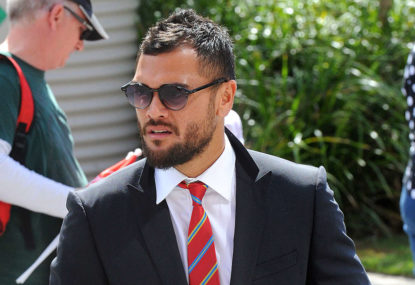Five and a kick: Hasler's pain game, RTS is a choke point and why Souths should give Demetriou a month
Anzac Round is done and another NRL touchpoint is ticked off amid the onward march of the 2024 season. It helps to see things…

In 2009, I wrote that some sports stars needed a reality check. Not a whole lot has changed in six years, with management across codes failing to enforce business-wide cultures of professional behaviour and compliance with contracts.
Around the time I wrote that article I was working for a Top 20 company, negotiating business partnerships with various organisations.
One particular proposal came from a first-grade team who wanted us to pay tens of thousands of dollars for their team members to lecture hundreds of our staff about health and safety.
The problem was that in the last 12 months, their top five players – the ones they wanted to be paid big bucks for – had been on very public criminal charges for violent and alcohol-related crimes.
When I pointed out that fighting and alcohol abuse were sackable offences on work sites, the club reps looked blank. The fact that their players were local heroes was enough, surely?
When I asked why they thought the business should pay tens of thousands of dollars to men whose values and behaviours were clearly at odds with ours, I was told blithely, “Oh, that’s just the sort of behaviour you get when a few young blokes who earn over $200,000 a year get together.”
Really? Thanks but no thanks.
There’s the rot. Despite regular drug and crime scandals over the last few years, the codes remains willfully blind to how unacceptable it is for professional people to behave the way that a minority of their players do.
And it is a small minority of players. But in this situation the silent, well-behaved majority don’t count. Their collective silence has kept in jobs the players and management whose values and behaviours are wrecking their much-loved codes.
The silent, well-behaved majority is still swallowing the spin that an apology wipes the slate clean. Apologies from sporting organisations have become meaningless. They used to be the silver bullet in the crisis management plan, now they’re Monday morning water cooler jokes.
Players are good at the first part of an apology – expressing remorse and a committing not to do it again. The second part is actually behaving differently. Here they fail dismally and regularly, proven by the fact that, over the last five years, players’ transgressions against their codes’ values are too numerous to list in a reasonable length article.
Regarding the current cocaine investigations, I’m surprised to see Roarers expressing a ‘drug use is victimless’ position.
In reality, a football-tragic Roarer living in Colombia wears the consequences of the cocaine trade every day. Being randomly victimised by gangs and government officials is part of getting to and from work.
The cocaine trade is worth $300 billion but only 2.5 per cent of the money stays in the country. None goes through the tax system, which is why the average Colombian lives on $692 a month.
By the time a friendly dealer drops off that little bag on a Saturday night, it’s left a trail of victims in its wake, some dead and some just condemned to living in lawless squalor. So when a Roarer asks, “Is it worth ruining a man’s livelihood for partaking in an activity that has become fairly commonplace?” I say yes.
Players who associate themselves with the drug business are contemptuous of the enormous privilege of being paid very well to play sport. They need to take a quick look at how a lot of their peers live.
One in six Australians aged between 15-24 lives in poverty. 300,000 Australians under the age of 25 spend over 40 hours a week as unpaid carers of family or friends with a disability. Most of them would give their eyes and teeth just to have time to kick a footy around the park occasionally. For the small minority of players who don’t treat their contracts as a privilege, sacking is perfectly fair.
Bad behaviour is not what you get when a few young blokes on $200,000 a year get together.
Bad behaviour is what you get when slack management doesn’t enforce a universal culture of professional behaviour, and when the fans who own the game don’t demand it.